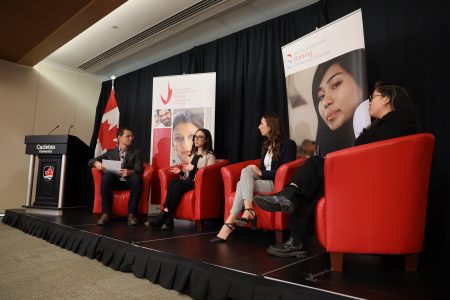Carleton PhD students Alicia McVarnock (Developmental Psychology) and Chikezirim Nwoke (Anthropology) have both been awarded a Vanier Canada Graduate Scholarship valued at $50,000 per year for three years during a student’s doctoral studies. The coveted Vanier scholarships are awarded to Canadian PhD students who conduct exceptional research.
“All my congratulations to today’s recipients of the Vanier Canada Graduate Scholarships, and in particular, to the two Carleton students who are part of this select group. Alicia McVarnock and Chikezirim Nwoke embody the quality and positive impact of Carleton’s research and we can all take pride in their success,” says Carleton President Benoit-Antoine Bacon.
Faculty of Graduate and Postdoctoral Affairs Dean Patrice Smith concurs with these sentiments and adds that, “Recruiting exceptional graduate scholars to Carleton is a top priority and I am so pleased to see the Vanier program recognize the achievements of our exceptional students.
“Vanier recipients are leaders in innovation and exemplify a far-reaching commitment to sharing knowledge and shaping the future.”

Carleton University PhD student and Vanier award winner Alicia McVarnock explains her research in a livestreamed event with Parliamentary Secretary Adam van Koeverden moderating.
Alicia McVarnock’s Research
McVarnock’s research examines shyness in young adults. Typically, shyness in this age group is linked to a range of social and emotional difficulties. But less is known about how shyness may be connected to academic adjustment in university.
McVarnock will be conducting two studies. The first will look at shy young adults’ course preferences and enrolment using a newly-developed questionnaire and interviews. The second will explore links over time between shyness, academic adjustment (i.e., academic achievement, communication, self-efficacy, intrinsic value, self-regulation, burnout, test anxiety and student satisfaction), well-being, academic communication, temperament-environment, goodness of fit and gender.
“It is hypothesized that shyness will predict academic difficulties and lower well-being over time through reduced academic communication with professors and peers,” says McVarnock. “It is also hypothesized that shy students will prefer lecture- and online-style courses as compared to seminars, and that links between shyness and poor academic outcomes may be magnified in seminar-style courses.”
Along with informing the academic and research community, her research will have implications for educational institutions to begin developing interventions targeted toward promoting academic success among shy young adults.